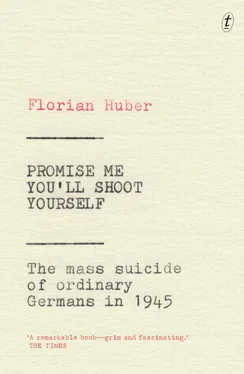Soviet grenades rained down without cease throughout the Reich Chancellery garden and the government district. The thunder of cannon fire grew ever fiercer. Walls and houses were collapsing on all sides. A thick haze of acrid smoke and dust smothered the entire area, and sand crunched between people’s teeth. While Hitler’s adjutant and chauffeur hurried to fetch the canisters of petrol they would need to carry out his final order, their Führer sat down to lunch with his cook and secretaries. After lunch, he said goodbye to them and his other trusted employees—among them his close confidant Martin Bormann, propaganda minister Joseph Goebbels and his wife, Magda, and a few high-ranking officers. A weary handshake, a few mumbled words. His wife stood beside him. He was wearing his habitual brown uniform jacket and a pair of black trousers.
• • •
As the soldiers of the 1st Belorussian Front pushed forward into the heart of Berlin, their comrades from the 2nd Belorussian Front were outside Demmin. Late on the morning of 30 April, the first troops of the 30th Tank Brigade reached the small southern district of Vorwerk, just across the River Tollense from the old town. They had seventeen IS-122 heavy tanks, a number of armoured personnel carriers and self-propelled guns, and about four hundred infantry soldiers. On the twenty-kilometre march to Demmin that morning they had captured 805 prisoners, 120 cars and ten motorbikes, and destroyed a battery of three flak guns that had been supposed to hold off their steel behemoths. There were still boy-faced soldiers lying dead by the roadside days later. Towards noon, the tanks got stuck at the Tollense, because the bridge had been blown up. Soviet pioneers set to work to build a temporary bridge over the not quite twenty-metre-wide river.
Before long, the Soviets were also making inroads from the east along Reich Road 110, heading for the tree-lined stretch known as Jarmener Chaussee, which led towards the town centre. Here on the edge of town, in the abandoned house by the cemetery, Irene Bröker and Dr P. and his wife had known since morning that their attempt to get away had failed, and that the advancing Soviets would overrun them. ‘We heard desolate cries and shots in the distance,’ she later remembered. In vain they searched the cellar and attic for somewhere to hide. Out in the garden, Irene came across a brick-lined shelter dug into the ground beneath a compost heap, its narrow entrance concealed by raspberry canes. They would soon need it:
When we heard explosions and then gunfire, it was clear to us all that the Russian army had caught up with us. The four of us fled into the hole beneath the compost heap with a blanket. I saw soldiers’ legs in the garden next door and heard my heart pounding in my ears.
She sat at the entrance to the passageway, the reek of slurry and the roar of the advancing army all around her. Alarmed by the noise and his mother’s whispers, two-year-old Holger set up a wail. Irene saw a soldier’s boot trampling twigs, inches from her face, and heard a shot whistle past her neck into the shelter. A solitary Soviet soldier, with an old, broad peasant’s face, grey and fierce and furrowed, drove her out of the hole at gunpoint. Irene Bröker’s flight from the Russians was over. The soldier took her back to the house and told her in stuttering German that he’d been taken prisoner by the Germans in the First World War. They saw him often after that; he’d drop in on them to make sure that the little boy was all right. The soldier warned Irene and her companions to be careful:
He told us that not all soldiers were good—there were a lot more coming and we ought to hide. We saw Russian planes passing over town. The town centre was swathed in thick smoke. There were fires all over the place. When I looked out of the attic window, I could see flames blazing up into the sky.
• • •
Driving back from Nossendorf with the petrol on board and his heart in his mouth, Gustav Skibbe only just made it to the west bank of the Peene before his comrades blew up the bridge. In his war journal, his usually neat handwriting becomes a nervous scrawl, as if he were reliving that drive back across the Peene with the hot breath of war on his neck:
When we got back to the bridge by the harbour, the Russians were there, having come in over Tollense Bridge! Shelling in town from Tutow at the same time. Hasty retreat… as far as Gnoien.
That was Gustav Skibbe’s last entry on Demmin. He never saw the town again.
• • •
After the Wehrmacht and the SS had, for reasons of military strategy, spared Demmin a final battle, some of the townspeople found the courage to ignore the fanatics’ threats. White flags, hastily cobbled together out of poles and sheets or towels, were hung out of windows. There was even one rigged up on the church tower, visible for miles. At the vicarage, a sheet was fixed in the dormer window. The vicar’s wife, Maria Buske, and her father had spent the day before on their hands and knees, chiselling out the bars of their cellar windows with household tools. They had eventually managed to break open an escape route, but now that the bridges had been blown up, there was nowhere to escape to.
Maria Buske and her two small sons had been waiting for the boys’ father to return since he’d been called up at the beginning of the war. She worked for the Red Cross and remained in the vicarage, a two-storey house marked out from the others on Baustrasse by its distinctive gable. Over the past days it had become something of a refuge: eighteen people, including a refugee family from Stettin with seven children, were crammed into the small house. The Buskes had abandoned their last-minute attempt to leave, because there was no longer any way out of town. Maria would later describe that night for her son:
We young women sat in the cellar with the children. My parents went into the garage at the end of the garden to avoid the risk of shrapnel, and so as to be on hand in case we were buried under debris. We were the only people left on our block. The others had fled to the country to escape the shock of the first Russian attack.
In the cellar, they heard shots all the way from Treptower Strasse, as the first Russian tanks moved into Demmin. But the final battle wasn’t fought by the Wehrmacht or the SS, by reservists or a trained guerrilla force; it was fought by a lone civilian, Gerhard Moldenhauer, a schoolmaster from Demmin. When fellow teacher Wilhelm Damann met him in the early 1930s—they had flats in the same building—Moldenhauer was an opponent of Hitler. As Damann later explained, this meant that his neighbour faced a dilemma when Hitler came to power:
He was too intelligent to be taken in by the hocus-pocus of the Third Reich, but at the same time too ambitious and too young to be willing or able to be relegated to the sidelines. Frau Moldenhauer and their three children were keen Hitler supporters, the girls in particular.
Like millions of other Germans, he’d had to make a choice: either he could toe the line and silence his inner voice, or he could stay true to his convictions and be ostracised. On this choice hung, on the one hand, his future and the unity of his family and, on the other, his peace of mind and self-respect. Unlike his colleague Damann, who was fired when the Nazis came to power, Moldenhauer decided to take a gamble on life in the ‘new’ Germany rather than resist the pressure of circumstances and the expectations of his family. He joined the Nazi Party, opening the door to a teaching career in the Third Reich.
At around noon on 30 April 1945, the entire Moldenhauer family was sitting in the cellar beneath the building at 6 Treptower Strasse. They heard the three bridges being blown up. They heard the rumble and roar of the approaching tanks. After a while, Gerhard Moldenhauer took out his gun and shot his wife and three children, one after the other. Then he made his way upstairs. Damann heard the details from a neighbour:
Читать дальше












